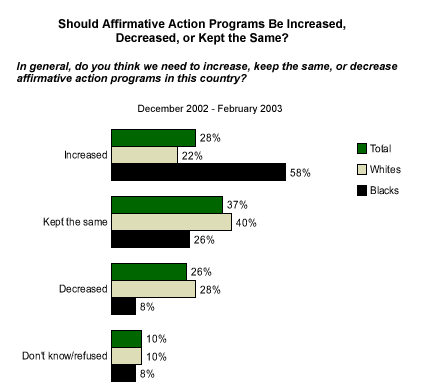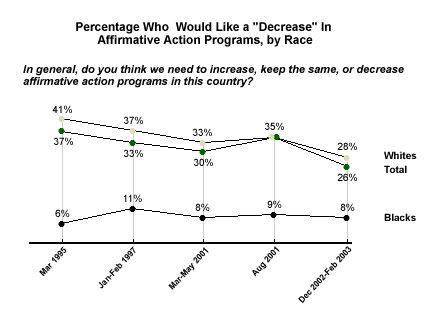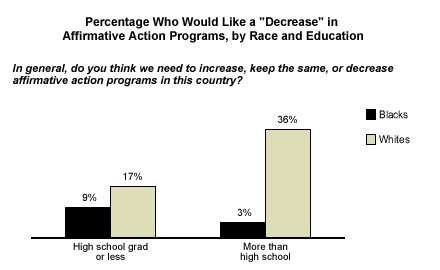There has been much media discussion about affirmative action programs in education over the last several months, largely resulting from a lawsuit brought against the University of Michigan for including race as a factor in its admissions decisions -- a case which makes its way today before the U.S. Supreme Court. Gallup's latest social audit of race relations in the United States* indicates that there are fewer Americans today than in previous Gallup surveys who feel that affirmative action programs should be decreased.
According to the latest poll, conducted between December 2002 and February 2003, 26% of the nation's adults think a decrease in affirmative action programs is needed, while 28% would like to see an increase, and 37% would like the programs to remain the same. The anti-affirmative action sentiment appears to be declining gradually. When Gallup first asked this question in 1995, more than a third of Americans (37%) wanted to see affirmative action programs decreased, and in a major survey in 2001, 30% wanted to see a decrease.
Gaps between white Americans' and black Americans' opinions toward affirmative action have generally been consistent. Certainly, that gap is still wide; currently, 22% of white respondents would like to see affirmative action programs increased, compared with a firm majority of blacks (58%). At the other end of the spectrum, 28% of whites feel these programs should be decreased, compared with only 8% of blacks who say the same.

However, the most recent results reveal a shift in white Americans' opinions, suggesting some narrowing of the familiar racial division on this issue. For the first time since Gallup began asking this question in 1995, a clear plurality of whites (40%) say they would like to keep affirmative action programs at their current level. And although the percentage of whites who would like to see a decrease in affirmative action (28%) is much higher than the corresponding percentage among blacks, it is at its lowest level since 1995.

Whether this movement toward greater acceptance of affirmative action corresponds with increased public support for specific affirmative actions policies, such as the one under review at the University of Michigan, is not clear. As discussed in a recent Gallup Poll Tuesday Briefing story (see "The Gallup Brain: Bakke and Affirmative Action" in Related Items), historical Gallup data indicate that while majorities of both black Americans and white Americans support affirmative action programs that encourage the hiring and admissions of minorities, clear majorities of both groups oppose policies that involve "lowering standards in order to make up for past discrimination." However, in the warming climate of acceptance toward affirmative action, Michigan's argument that its policy is not just aimed at correcting past discrimination, but is a proactive measure to improve diversity on campus, might receive a more favorable public reaction than it would have in the past.
Sentiment toward affirmative action appears more negative overall among those with higher levels of income and education. However, a closer look reveals that this pattern characterizes the opinions of the white majority, but not of the black minority. Among whites with a high school degree or less, 17% would like affirmative action programs decreased, while that percentage swells to 36% among those with more formal education. In a starkly contrasting pattern, 9% of blacks with a high school diploma or less feel that affirmative action programs should be decreased, and that percentage drops to 3% among blacks with more education.

In a similar pattern, national samples appear to reveal a distinct gender gap in opinion on this question, but separating the sample by race makes it clear that this gap is exclusive to white respondents. While 35% of white men think affirmative action programs should be decreased, only 22% of white women hold that opinion. Only 8% of black Americans hold this opinion, regardless of gender.
*Gallup conducted 1,044 telephone interviews from Dec. 9, 2002, through Feb. 11, 2003, with a randomly selected sample of adults in the United States. We interviewed roughly equal numbers of black respondents and white respondents, permitting more reliable estimates of black opinion than would be possible in a standard national sample of a similar size. For our total sample of 1,044, one can say with 95% confidence that the margin of sampling error for percentages is not greater than ±5%. The parallel margins of sampling error are ±6% for the sample of 505 white respondents, and ±6% for the sample of 501 black respondents.
